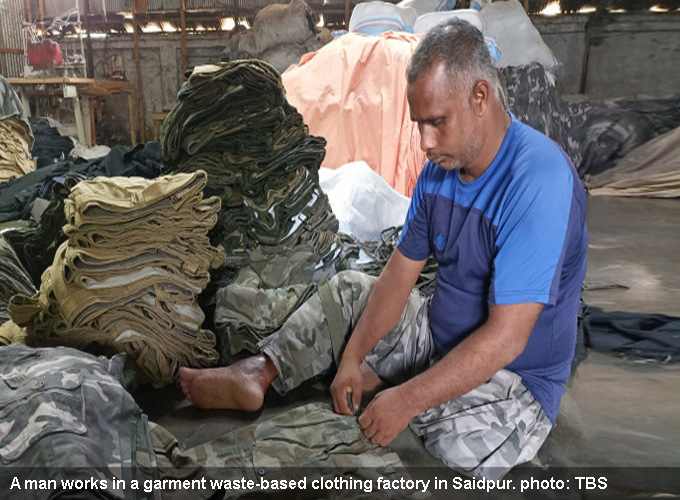
Category: General
Country: Bangladesh
Region: South Asia
Jackets, trousers, T-shirts made of recycled yarns worth crores of taka are being exported to India, Nepal, and Bhutan
By Khorshed Alam
Last modified: 08 October, 2023, 04:46 pm
A decade ago, Md Jhantu Mia's life took a drastic turn when he was struck by a speeding truck while crossing the road, resulting in the amputation of one of his legs. This unfortunate accident left him unemployed. He previously worked at a truck garage. However, today, Jhantu has found a new source of livelihood in Saidpur Upazila of Nilphamari district.
In Saidpur, there are at least 500 families who have also turned to jhut-cloth factories as a means of their livelihood. These small-scale manufacturing businesses utilise 3 to 45 machines to produce textile products from fabric scraps, commonly known as "Jhut."
The products find their way into international markets, extending beyond the borders of Bangladesh.
To meet the growing demand for garments made from fabric scraps, an export-oriented Garment Owners Association has been established in Saidpur, comprising approximately 250 entrepreneurs and factory owners. The fabric scraps-based garment industry in Saidpur gained significant momentum in 2002 due to the increasing demand for these products.
Factories in Saidpur produce a variety of clothing items such as trousers, shorts, jackets, T-shirts, and jeans from fabric scraps. The demand for these clothing items is particularly high in India, Nepal, and Bhutan.
Traders acquire fabric scraps by kilogram from garment factories located in various parts of Dhaka, with prices varying based on the type of fabric. They also purchase old sewing machines, yarn, buttons, elastic, and stickers used in making clothing items from different parts of the country, selling these products in the market with prices ranging from Tk200 to Tk1500.
Thousands of workers, including Jhantu Mia, are engaged in the production of jute cloth-based clothing in Saidpur. Jhantu, who works at the HR Garment factory, finds working in a garment factory more manageable compared to his previous job at a truck workshop. With long working hours and overtime, he earns a monthly income ranging from Tk15,000 to Tk16,000.
Humayan Kabir, the proprietor of Invent Trade International Limited in Saidpur, said, "We usually export trousers, jackets, and shorts crafted from fabric remnants. Additionally, we operate a fabric scraps-based factory in Pabna. In total, our annual garment exports to India, Nepal, and Bhutan amount to Tk5 crore."
Motiar Rahman Dulal, a fabric scrap-based clothing exporter here, said his company, MR International, annually exports clothing and caps valued at $500,000. Notably, he has a hat manufacturing factory in Dhaka. MR International sources shorts and trousers made from fabric scraps (jhut) from multiple factories in Saidpur for export.
Saidpur's fabric scrap-based garment industry employs approximately 8,000 workers across 500 factories, with the export of these products commencing around 2021.
Another exporter RS International's Fayazul Haque Saju said "Annually, my company manufactures garments, including trousers and t-shirts valued at Tk10 crore to India, Nepal, and Bhutan."
He stressed the importance of addressing the slight decrease in the supply of fabric scraps.
The Export Oriented Small Garments Owners Group also highlighted disparities in prices and called for improvements in the supply chain, including direct procurement of Jhut and access to affordable loans.
Akhtar Hossain Swapan, director of the Nilphamari Chamber of Commerce and Industries, emphasised the positive impact of the Jhut-based garment industry development on the Northern region of the country.
He called for the transformation of Saidpur Airport into an international airport to enhance cross-border communication with India and facilitate product exports, which will create thousands of employment opportunities.
Courtesy: Tbsnews.net
Copyrights © 2025 GLOBAL TEXTILE SOURCE. All rights reserved.